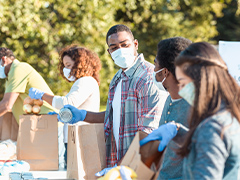How Volunteering Can Help Your Mental Health

Roughly 26% of adults in the United States volunteer. If you’ve ever talked with people who volunteer regularly, chances are most of them are really passionate about it. Why is that?
You might think that it’s because volunteering attracts a certain type of person. That’s true, volunteers tend to be highly motivated, enjoy social interaction and are concerned with the well-being of others. But that’s not the whole story.
Volunteering can benefit your mental health. And it’s possible that many of these people only became passionate about volunteering once they tried it.
Studies show that the more you volunteer, the happier you may be. You don’t need to already be happy to enjoy the mental benefits of volunteering, either. Studies also show that people who start with a lower level of well-being may receive a bigger boost in happiness from volunteering.
How your brain benefits from helping others
Happiness is a complex picture. Your experience volunteering taps into the many different facets of happiness, which is why it’s such an effective mood booster. Here are a few different ways:
- Helper’s high – This is a term that describes the feeling you have after volunteering. Volunteers describe it as a sense of extended calmness, reduced stress and a stronger feeling of self-worth.
- Life satisfaction – Volunteers report feeling more satisfied with their life. This includes a clearer sense of purpose and self-confidence.
- Changing how your brain ages – Those who volunteer in old age have been shown to reduce the cognitive decline associated with aging as well as feelings of depression and loneliness.
There are many reasons why volunteering may benefit our brains. Most importantly, it strengthens our social connections and sense of belonging. That’s because the physical and social health benefits of staying connected with others have been well-documented.
How you can get started
Now that you know the benefits of volunteering, let’s talk about the different ways you can do it.
Traditional volunteering is when you dedicate your free time here and there to a cause you care about. It could be at a dedicated nonprofit or simply with some people in your community. This could be local schools, nursing homes or food pantries. Traditional volunteering can range from a single day of work to a long-term commitment over the course of several weeks.
Online volunteering can be a great way to help others if you’re short on time or want to help people who do not live in your area. Common ways to volunteer online include tutoring, chatting with senior citizens and making donation calls for a nonprofit organization.
Voluntourism is a term that describes when you combine travel and volunteering. This can be a good way to see a new part of the world and make a difference there. Be sure to research the cause and where you’re traveling to before committing.
If you’re looking to improve your mental well-being and feel happier, we can help you stay motivated. The Online Health Coach can reward eligible members for taking steps to feel happier.* You'll receive $40 for each eligible goal completed, up to three, for $120 total.
*You must be the contract holder or spouse, 18 or older, on a Standard or Basic Option plan to earn incentive rewards
Source:
https://www.webmd.com/mental-health/mental-benefits-of-volunteering


